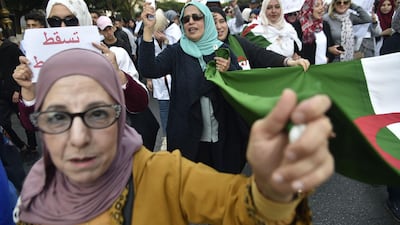A senior member of Algeria’s ruling FLN says that President Abdelaziz Bouteflika is history and the party must look forward and support demonstrators, just a week after the ailing octogenarian leader announced he would not stand for a fifth term amid mass protests.
Hocine Kheldoun’s comments are a fresh blow to the leadership who are hoping that Mr Bouteflika’s decision not to seek another term and oversee a political transition would have taken the steam out of the protest movement. However, with protests planned for Friday, which organisers say will be the largest yet, that does not appear to be the case.
FLN holds the majority in all elected assemblies, including parliament and local city councils.
Tens of thousands of Algerians have staged protests for weeks to demand a new era with younger leaders who would offer greater social freedoms and a healthy economy.
Mr Bouteflika, 82, has rarely been seen in public since suffering a stroke in 2013. Many believe that a shadowy group of unelected advisers, nicknamed “Le Pouvoir”, are actually running the country in Mr Bouteflika’s place.
But the president has lost one ally after another in recent weeks as he holds on. Last week, more than 1,000 judges refused to oversee the election if the president’s name was on the ballot.
Although many respect Mr Bouteflika for ending the Islamist insurgency and bringing the country together in the years after the bloody civil war in the 1990s, protesters are demanding change.
Through the 2000s, the president led a large investment drive to try to modernise the country off the back of large oil and gas supplies. However, when oil prices fell in 2014, the project hit a wall. Public subsidies now account for more than 20 per cent of the national budget and despite the years of spending, many Algerians remain unemployed. Many feel that the boom years largely benefited those at the top and did not sufficiently trickle down to the general public.
Lakhdar Brahimi, a former Algerian official and two-time UN and Arab League special envoy, on Wednesday denied that he had been tasked with overseeing the transition but said that he would do so if asked. Reuters had quoted government sources as saying that the 85-year old had been tapped to lead a national dialogue session to chart the country’s future.

